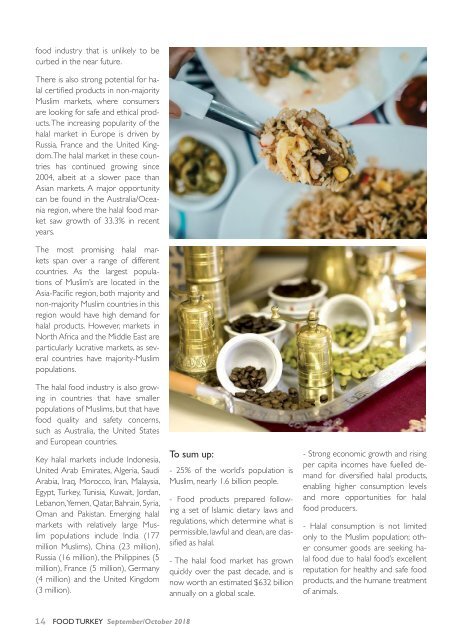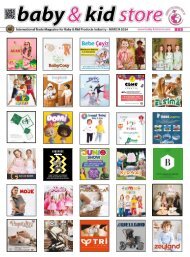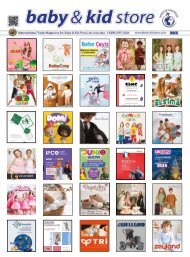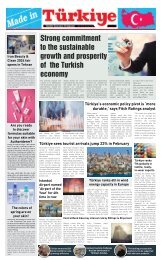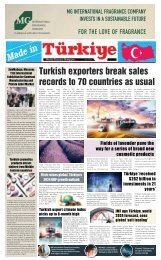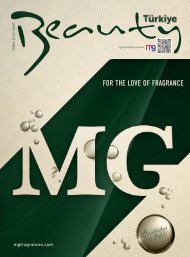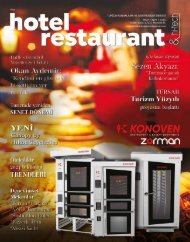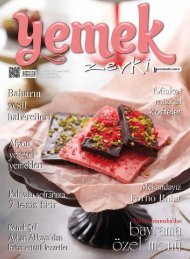Create successful ePaper yourself
Turn your PDF publications into a flip-book with our unique Google optimized e-Paper software.
food industry that is unlikely to be<br />
curbed in the near future.<br />
There is also strong potential for halal<br />
certified products in non-majority<br />
Muslim markets, where consumers<br />
are looking for safe and ethical products.<br />
The increasing popularity of the<br />
halal market in Europe is driven by<br />
Russia, France and the United Kingdom.<br />
The halal market in these countries<br />
has continued growing since<br />
2004, albeit at a slower pace than<br />
Asian markets. A major opportunity<br />
can be found in the Australia/Oceania<br />
region, where the halal food market<br />
saw growth of 33.3% in recent<br />
years.<br />
The most promising halal markets<br />
span over a range of different<br />
countries. As the largest populations<br />
of Muslim’s are located in the<br />
Asia-Pacific region, both majority and<br />
non-majority Muslim countries in this<br />
region would have high demand for<br />
halal products. However, markets in<br />
North Africa and the Middle East are<br />
particularly lucrative markets, as several<br />
countries have majority-Muslim<br />
populations.<br />
The halal food industry is also growing<br />
in countries that have smaller<br />
populations of Muslims, but that have<br />
food quality and safety concerns,<br />
such as Australia, the United States<br />
and European countries.<br />
Key halal markets include Indonesia,<br />
United Arab Emirates, Algeria, Saudi<br />
Arabia, Iraq, Morocco, Iran, Malaysia,<br />
Egypt, Turkey, Tunisia, Kuwait, Jordan,<br />
Lebanon, Yemen, Qatar, Bahrain, Syria,<br />
Oman and Pakistan. Emerging halal<br />
markets with relatively large Muslim<br />
populations include India (177<br />
million Muslims), China (23 million),<br />
Russia (16 million), the Philippines (5<br />
million), France (5 million), Germany<br />
(4 million) and the United Kingdom<br />
(3 million).<br />
To sum up:<br />
- 25% of the world’s population is<br />
Muslim, nearly 1.6 billion people.<br />
- Food products prepared following<br />
a set of Islamic dietary laws and<br />
regulations, which determine what is<br />
permissible, lawful and clean, are classified<br />
as halal.<br />
- The halal food market has grown<br />
quickly over the past decade, and is<br />
now worth an estimated $632 billion<br />
annually on a global scale.<br />
- Strong economic growth and rising<br />
per capita incomes have fuelled demand<br />
for diversified halal products,<br />
enabling higher consumption levels<br />
and more opportunities for halal<br />
food producers.<br />
- Halal consumption is not limited<br />
only to the Muslim population; other<br />
consumer goods are seeking halal<br />
food due to halal food’s excellent<br />
reputation for healthy and safe food<br />
products, and the humane treatment<br />
of animals.<br />
14 FOOD TURKEY <strong>September</strong>/<strong>October</strong> <strong>2018</strong>


